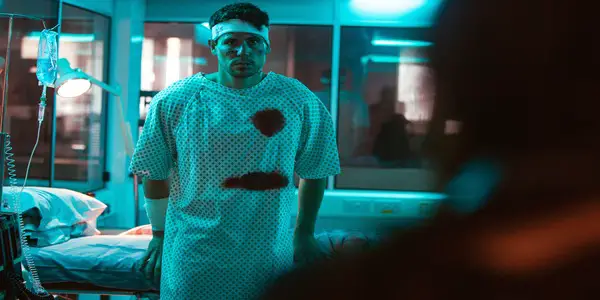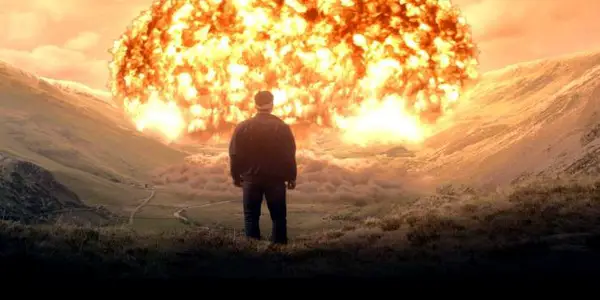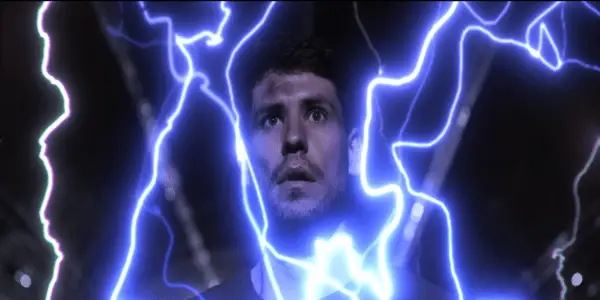BREAKING INFINITY: A Time Travel Adventure That Proves Story Is More Important Than Budget

Spent most of my life watching and discussing movies. Writing…
The conceptualization of time travel as a narrative device is nothing new. Mucking about with the space-time continuum only to have caused a butterfly effect that branches out like a crack in a windshield, affecting history yet to pass with fracturing chaos. These well-tread tales of chronology gone awry have always captivated the imagination, though when put into a cinematic sense generally it comes with a hefty price tag. Such is not the case with first-time feature film director Marianna Dean‘s Breaking Infinity.
Made on a shoestring budget of around £200k, Breaking Infinity manages to craft a high-concept sci-fi drama without the trappings of a Hollywood budget. The film is the brainchild of screenwriter David Trotti, who had cut his teeth as an assistant director in both film and television since the early 1990s, his script plays more with the discussion and theorization of time travel without relying heavily on visual effects to relay his core intent as the plot unfolds. With its sparse cast of characters, modest sets, and limited use of CGI, Trotti‘s script is the cookbook for solid “budget” sci-fi.
Learning From The Past
Breaking Infinity tells the story of Liam (Neil Bishop), a man who wakes up in a science research facility with no memory of who he is or why he is there. Haunted by broken visions of apocalyptic mushroom clouds, fuzzy recollections of being injured, and an ominous Old Man (Martin Bishop) who speaks in riddles, Liam becomes obsessed with finding out what has happened to him. Enter Emma (Zoe Cunningham), a sympathetic doctor who becomes Liam’s only hope of finding out the truth.

Liam comes to with a series of brutal injuries that leave him bedridden and at the mercy of the emergency pain medication button there to inject a single dose in times of discomfort. Hitting the pain relief, Liam is rendered unconscious. Slipping into a fugue state he recalls a flash in time and wakes up healed. He continues to inject himself with the one-shot pain meds over and over causing him to time jump with the same result of receiving short glimpses of memory and returning to his body in whatever condition he was in at that point in time.
Don’t worry. This all makes sense in the end.
As the story moves forward (or backward depending on where the screenplay leaves you) we learn right alongside Liam, knowing only as much as he does about his current predicament. Emma tries to help Liam piece together the memories, uncertain if he is insane, traumatized, or telling the truth.

Neil Bishop and Zoe Cunningham have a playful rapport from scene to scene, jumping from panicked to calm in a blink of an eye as the movie bandies you about in quick narrative blasts. A time loop who-done-it that takes care of how it doles out clues throughout the efficient 1-hour 26-minute runtime.
Where Have We Seen This Before?
The plot devices feel reminiscent of films such as Christopher Nolan’s Memento (2000) with a hint of Edge of Tomorrow (2014). Mind you, Memento is not a time travel story, the same boxes are ticked. The protagonist hunts for the truth, adding to a puzzle with no blueprint, and like Edge of Tomorrow, gains a stronger foothold toward the answer with each strenuous attempt. Breaking Infinity uses the tropes of time travel to its benefit, though a revisit might iron out some of the wrinkles from a first watch.
There is a procedural television aurora to the production. Understandable, given the writer’s time spent on several Star Trek series, where learning to create on a budget is a craft in and of itself. This is not a flaw, but rather a strength when working with Indie money. The CGI, for what it was, kept it low-key, only sprinkling it in when necessary to not overwhelm the sharp writing.

In a cinematic landscape assaulting audiences with over-stylized, underfunded visual FX because a project harbors a glint of science fiction, it is refreshing to follow the story beat to beat instead of checking out between sensory overloading action sequences. That is not to say Breaking Infinity doesn’t have its share of world-ending explosions, it’s just a touch more restrained in approach.
Where Did We Land?
As stated previously, time travel stories are nothing new. Heck, the same can be said of most genres. But it’s how pen hit paper that matters. Taking tired ideas for a walk and finding a new path, Breaking Infinity deftly achieves just that. The film is never afraid to turn down the volume for the sake of the story while awakening the senses with a jarring smash cut in the same breath.
Director Marianna Dean and writer David Trotti have crafted an engaging, time-travel mystery that drops the viewer into the plot and keeps the intrigue flowing.
Breaking Infinity will be available in theaters in the UK on June 1st and digital on July 3rd.
https://youtu.be/w4RIxO1WpgIWatch Breaking Infinity
Does content like this matter to you?
Become a Member and support film journalism. Unlock access to all of Film Inquiry`s great articles. Join a community of like-minded readers who are passionate about cinema - get access to our private members Network, give back to independent filmmakers, and more.
Spent most of my life watching and discussing movies. Writing is a way to keeping the conversation going with the rest of the world.













